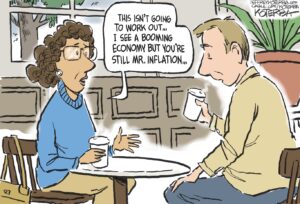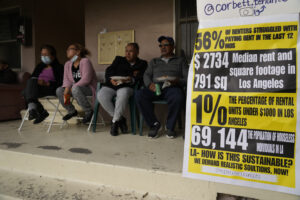Long-Term Joblessness Taking Toll on Men
A recent report by the Bureau of Labor Statistics found that more than one in four American males taking part in a longitudinal study had endured at least one period of extended unemployment during their working lives.
Even before the Great Recession, it was a tough world out there for American workers.
A recent report by the Bureau of Labor Statistics found that more than one in four American males taking part in a longitudinal study had endured at least one period of extended unemployment during their working lives. And among African-American males, the rate was more than two in five.
Although most eventually found work, the average time out of a job during the first extended period was just over a year.
Those who went without work for six months or more endured, as one might expect, a severe hit to family finances, including drawing down savings and having trouble meeting mortgage and rent payments — the kinds of repercussions that make it all that much harder for families to maintain some financial stability, and imperils children’s school performance.
Researchers find that workers who have been unemployed due to job displacement often experience persistent subsequent earnings losses, earnings volatility, and later periods of job loss, although none of these studies looks specifically at the long-term unemployed. When a household member is unemployed, household finances suffer, which often leads to depleted savings, increased debt, and trouble making rent or mortgage payments. In addition to negative financial impacts, long-term unemployment may adversely affect the physical and mental health of the unemployed and may negatively affect their children’s academic achievement.
The study, part of the BLS’ “Beyond the Numbers” series, is based on data drawn from 12,686 male and female participants in the National Longitudinal Survey of Youth 1979, all of whom were born between 1957 and 1964. Participants were interviewed annually through 1994, then biannually. In 2010, the last year included in the study, participants were between the ages of 45 and 53. Notably, the study focused only on men because, according to report author Donna S. Rothstein, women’s “labor force participation is generally more complicated because of their role in child bearing and child care.”
Still, the report offers some jarring findings.
Some 41 percent of high school dropouts reported at least one spell of long-term unemployment. Those with high school degrees fared somewhat better, with one-quarter of them suffering through extended joblessness. Among those with a four-year college degree, the rate dropped to one in 10.
For those out of work, wages tend to stagnate, or reverse, once they regain jobs.
In the first years after the long-term spell, wages might be lower as the skills and knowledge that were valued by their former company may no longer be useful in their new job, and their general human capital (skills and knowledge valued by all companies) may have depreciated. If the men who were reemployed can build up their skills and knowledge in their new job, their wages may increase again over time. However, if individuals face additional periods of joblessness, wages may not recover over time.
In fact, Rothstein writes that four years after the first long-term spell ended, hourly wages were 7 percent below what they were four years before the unemployed spell began.
—Posted by Scott Martelle.
Your support matters…Independent journalism is under threat and overshadowed by heavily funded mainstream media.
You can help level the playing field. Become a member.
Your tax-deductible contribution keeps us digging beneath the headlines to give you thought-provoking, investigative reporting and analysis that unearths what's really happening- without compromise.
Give today to support our courageous, independent journalists.






You need to be a supporter to comment.
There are currently no responses to this article.
Be the first to respond.